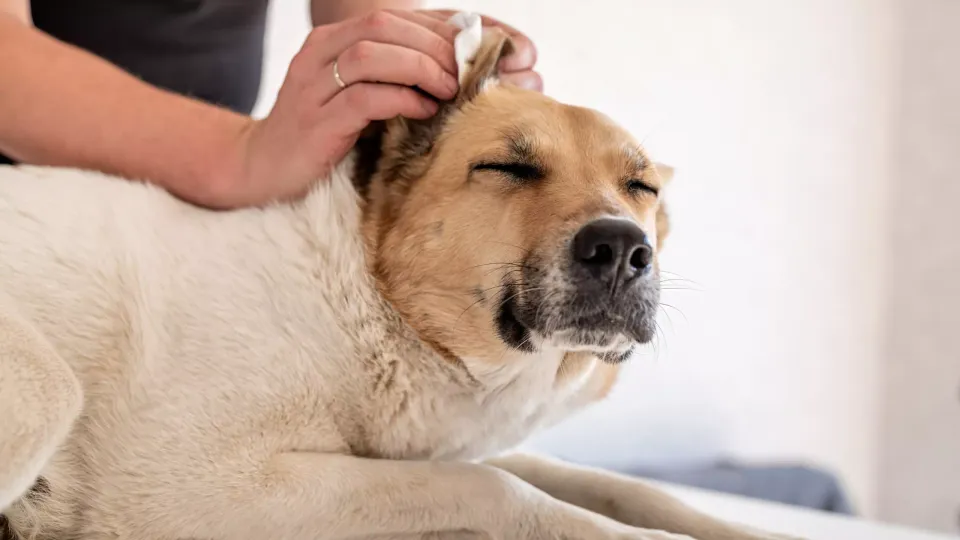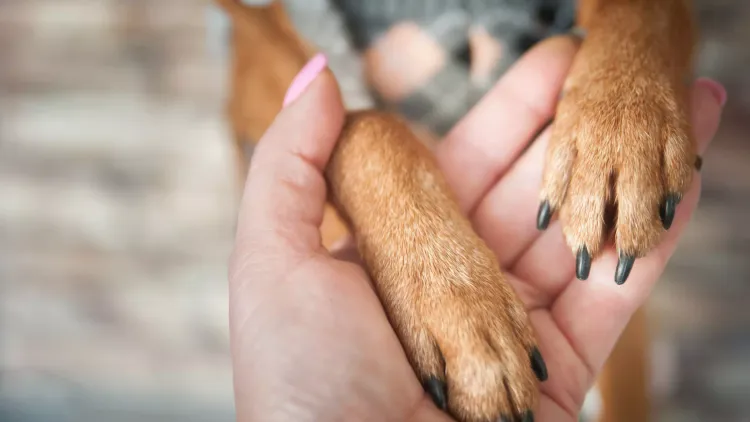Ear Care 101: How to Naturally and Safely Clean Your Dog's Ears

Caring for our furry companions goes beyond regular feeding and occasional playtimes; it delves into ensuring their overall health and comfort, with ear care being paramount. Dogs, just like humans, can experience discomfort, itchiness, and infections in their ears if not properly maintained.
Regular ear cleaning not only ensures that your dog remains free from potential ear ailments but also provides an opportunity to check for signs of infections, mites, or other issues that might go unnoticed. In this guide, we'll explore the intricacies of dog ear care, debunking common myths, and providing step-by-step instructions to ensure your dog's ears remain clean and healthy.
Why Clean Your Dog's Ears?
The ears are one of the most sensitive organs in a dog's body, playing a crucial role in their overall well-being. Regular ear cleaning is essential for several reasons:
- Prevention of Infections: The warm, dark environment of a dog's ear canal is a perfect breeding ground for bacteria, yeast, and mites. Without regular cleaning, these microorganisms can multiply, leading to painful infections.
- Wax and Debris Buildup: Just like humans, dogs produce earwax. Over time, this wax, combined with dirt and debris from the environment, can accumulate in the ear canal. This buildup can obstruct the ear canal, impair hearing, and create an environment conducive to infections.
- Early Detection: Regular cleaning allows pet owners to inspect their dog's ears for signs of issues such as redness, swelling, discharge, or unusual odors. Early detection of these signs can lead to prompt treatment, preventing more severe complications.
- Comfort and Well-being: Dirty ears can cause discomfort, itching, and even pain for dogs. They might respond by scratching their ears excessively or shaking their heads, which can lead to further injuries or conditions like an aural hematoma (a blood-filled pocket on the ear).
- Maintaining pH Balance: A dog's ear has a specific pH level that helps inhibit the growth of harmful bacteria and yeast. Using appropriate cleaning solutions helps maintain this balance, ensuring the ear environment remains healthy.
- Enhanced Bonding: The act of cleaning your dog's ears can also serve as a bonding activity. It provides an opportunity for physical touch, reassurance, and positive reinforcement, strengthening the bond between the dog and the owner.
Cleaning your dog's ears is not just a grooming routine but a vital aspect of their health care. It ensures their comfort, prevents potential health issues, and allows for early detection and treatment of problems.
How to Safely Clean Dogs Ears at Home Naturally:
Cleaning your dog's ears is an essential part of their grooming routine. However, it's crucial to ensure that the cleaning process is safe and effective. Here's a guide on how to clean your dog's ears without causing harm:
Choose the Right Cleaning Solution:
- Apple Cider Vinegar (ACV): ACV can be an effective natural remedy for cleaning your dog's ears and treating minor infections. However, it's essential to dilute it with an equal amount of purified water. ACV's acidic nature can help balance the ear's pH and create an environment where bacteria and yeast cannot thrive. Remember, never use ACV if your dog's ears are red or have open sores, as it can cause irritation.
- Avoid DIY Solutions: Homemade solutions like olive oil, vinegar, or alcohol can cause more harm than good. They can irritate the ear canal, leading to infections and potentially damaging the eardrum.
The Cleaning Process:
- Inspect the Ear: Before cleaning, inspect your dog's ears. If they're red, swollen, or have a foul odor, it might indicate an infection, and you should consult your vet.
- Use Cotton Balls or Pads: Soak a cotton ball or pad in the cleaning solution and gently wipe the inside of the ear. Avoid using Q-tips as they can push debris further into the ear.
- Massage the Base: After applying the cleaning solution, massage the base of the ear gently. This will help break up any debris inside.
- Let Your Dog Shake: After cleaning, allow your dog to shake its head. This will help remove any leftover solution and debris from the ear canal.
How Often to Clean Dog Ears
The frequency with which you should clean your dog's ears depends on several factors, including the breed, age, activity level, and individual health conditions of your dog. Here's a breakdown to help you determine the best schedule for your furry friend:
Breed and Ear Type:
- Floppy Ears: Dogs with floppy ears, such as Basset Hounds, Cocker Spaniels, and Labrador Retrievers, are more prone to ear infections. The floppy ear design can trap moisture, dirt, and debris, creating a conducive environment for bacterial and yeast growth. For such breeds, a weekly ear check and cleaning (if necessary) is advisable.
- Upright Ears: Breeds with upright ears, like German Shepherds and Siberian Huskies, have better air circulation in their ears, reducing the risk of infections. For these dogs, a bi-weekly to monthly ear inspection should suffice, with cleaning only when necessary.
Activity Level:
- Swimming and Water Activities: Dogs that love to swim or are frequently exposed to water may need their ears cleaned more often. Water can get trapped in the ear canal, leading to potential infections. After every swim or bath, ensure the ears are dried thoroughly, and consider cleaning them to remove any trapped water or debris.
- Outdoor Activities: Dogs that spend a lot of time outdoors, especially in dusty or windy conditions, may accumulate more debris in their ears. Regular checks after outdoor adventures can help determine if cleaning is needed.
Age and Health:
- Puppies: Young dogs are curious and often get into messy situations. While their ears might not need as frequent cleaning as adults, it's essential to check them regularly to ensure they're clean and to get them accustomed to the cleaning process.
- Health Conditions: Some dogs may have chronic ear conditions or allergies that make them more susceptible to ear issues. If your dog has a history of ear infections or other ear-related problems, your vet might recommend a specific cleaning routine.
Signs to Watch For:
Regardless of breed or activity level, always be on the lookout for signs that your dog's ears need cleaning. If you notice excessive wax buildup, a foul odor, redness, swelling, or if your dog is frequently scratching its ears or shaking its head, it might be time for a cleaning.
Consult Your Veterinarian:
The best advice will always come from your veterinarian. They can provide guidance tailored to your dog's specific needs and conditions. Regular vet check-ups will also include ear inspections, ensuring that any potential issues are caught early.
While there's no one-size-fits-all answer, being observant and understanding your dog's specific needs will help you maintain optimal ear health. Regular inspections, combined with a cleaning routine tailored to your dog's lifestyle and breed, will ensure their ears remain healthy and infection-free.
Warning Signs
If your dog shows signs of discomfort, constant scratching, head shaking, or any discharge from the ears, it might indicate an infection or another underlying issue. In such cases, consult your veterinarian immediately.
While regular ear cleaning is beneficial, it's crucial to do it correctly and safely. Always use vet-approved solutions and avoid any DIY remedies that can harm your dog's ears. If in doubt, seek professional advice.
Addressing Infected Ears
Ear infections in dogs can be painful and, if left untreated, can lead to more severe complications. Recognizing the signs and understanding the treatment options is crucial for every dog owner.
Signs of an Ear Infection:
- Odor: A strong, foul smell emanating from the ears is a common sign of an infection.
- Discharge: Yellow, brown, or bloody discharge can indicate an ear problem.
- Redness and Swelling: The ear canal or the ear flap might appear red and swollen.
- Behavioral Changes: The dog might shake its head frequently, scratch at its ears, or become more irritable than usual.
- Loss of Balance: In severe cases, an inner ear infection can affect the dog's balance.
Common Causes:
- Bacteria and Yeast: These are the most common culprits behind ear infections in dogs.
- Allergies: Allergic reactions to food, pollen, or certain medications can lead to ear infections.
- Ear Mites: These tiny parasites can cause severe itching and inflammation.
- Foreign Bodies: Grass seeds, water, or other debris trapped in the ear can lead to infections.
- Underlying Health Issues: Conditions like hypothyroidism or autoimmune disorders can predispose a dog to ear infections.
Treatment Options:
- Veterinary Examination: If you suspect an ear infection, the first step should always be a visit to the veterinarian. They can take a sample from the ear and examine it under a microscope to determine the cause.
- Medication: Depending on the diagnosis, the vet might prescribe antibiotic or antifungal ear drops, creams, or oral medications.
- Cleaning: Regular cleaning with a vet-approved ear cleaner can help in the treatment and prevention of further infections.
- Surgery: In chronic or severe cases, surgical intervention might be necessary.
Natural Remedies: (Use with Caution)
While some natural remedies, such as apple cider vinegar or coconut oil, are touted for their potential benefits, they should be used with caution and always under the guidance of a veterinarian. Some natural treatments can exacerbate the infection or cause discomfort to the dog.
Prevention is Key:
Regular ear checks and cleaning can help prevent many ear infections. Ensure the ears are dry after baths or swimming, and be cautious when using natural remedies without vet approval.
Wrapping Up
In the vast world of pet care, ensuring the health and cleanliness of your dog's ears is paramount. A dog's ears are sensitive and intricate structures that require gentle and informed care. While there are numerous methods and products available for ear cleaning, it's essential to prioritize safety and efficacy. Using vet-approved solutions and following the correct techniques can prevent potential complications, such as infections or damage to the ear canal.
As responsible pet owners, we must be cautious about the remedies and practices we adopt. While some home remedies might seem appealing, they can sometimes do more harm than good. It's always advisable to consult with a veterinarian before introducing any new cleaning regimen. By staying informed and attentive, we can ensure that our furry friends enjoy optimal ear health, contributing to their overall well-being and happiness.



